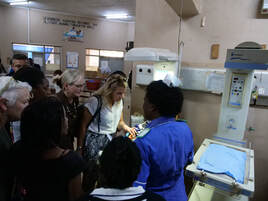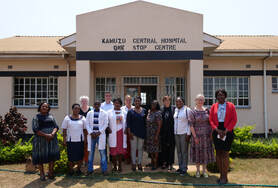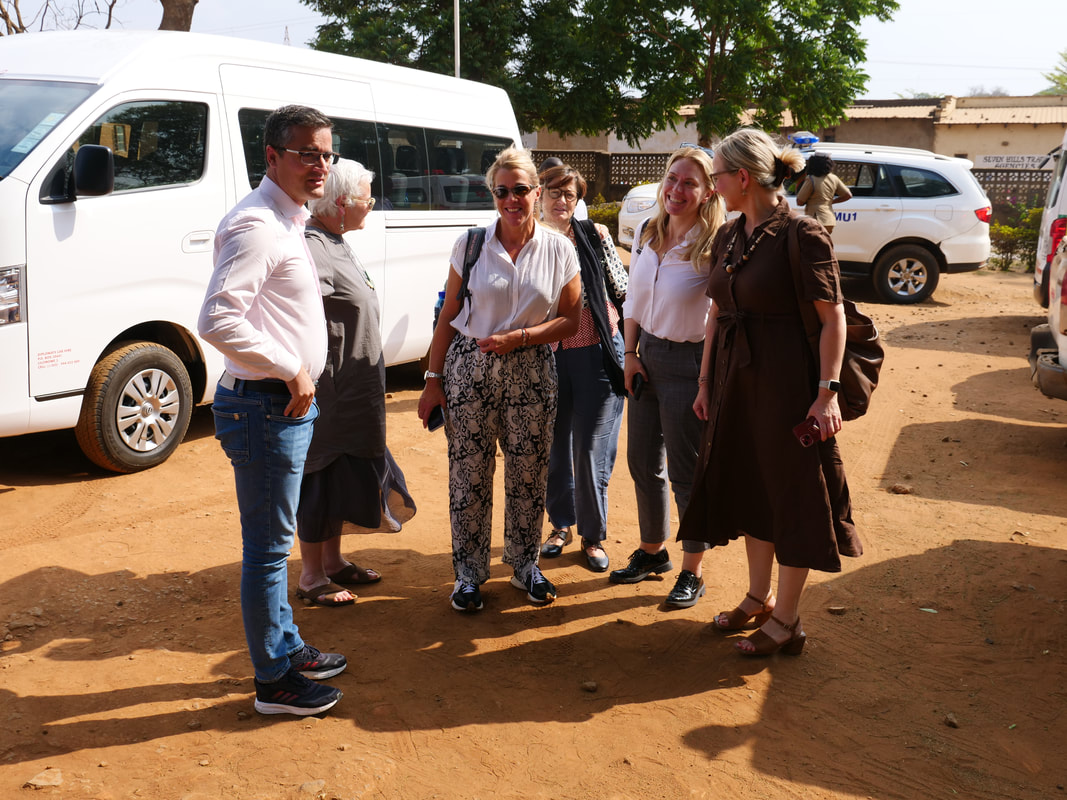What was the trip to Malawi like, and what have you taken on board?

It was instructive, disturbing and sometimes shocking. Because it was my first time travelling to a sub-Saharan African country. The places we visited were really not how I’d imagined. You can’t compare African hospitals to Belgian or European hospitals but I found the willingness and willpower to help inspiring. They perform miracles with very little resources.
What did you learn about maternal health?
Like I said before, people are very inventive. A lot is achieved with very few resources. We visited a hospital for women who had just given birth. Not all of them had a bed, they waited outside, with their newborn baby, because there was no room. Not enough beds, not enough nursing staff, etc. The women arrive with a neighbour or relative. The neighbour helps them until just before the delivery. There’ is very little equipment in maternity, not much staff, but they perform miracles.
What I also learned is that infant mortality is very high, many newborn children die, and so do many young women. During childbirth, but also due to the effects of clandestine abortions. Malawi has banned abortions (except when life-threatening). It’s a very Catholic country.
Women in Malawi have six children on average, and when they get pregnant because they don't always have access to contraceptives, they still have abortions, which they perform themselves, or with the help of a medicine man/healer. Sometimes it’s done with a needle, sometimes with a special herbal tea. The abortion often fails, and they suffer catastrophic consequences. They contract infections, and by the time they get to hospital, they’re often very ill, or their wounds have turned septic. On the other hand: , the nursing staff may be very Catholic and religious, but they do n’t condemn the women and they help them without prejudice.
What I also learned is that infant mortality is very high, many newborn children die, and so do many young women. During childbirth, but also due to the effects of clandestine abortions. Malawi has banned abortions (except when life-threatening). It’s a very Catholic country.
Women in Malawi have six children on average, and when they get pregnant because they don't always have access to contraceptives, they still have abortions, which they perform themselves, or with the help of a medicine man/healer. Sometimes it’s done with a needle, sometimes with a special herbal tea. The abortion often fails, and they suffer catastrophic consequences. They contract infections, and by the time they get to hospital, they’re often very ill, or their wounds have turned septic. On the other hand: , the nursing staff may be very Catholic and religious, but they do n’t condemn the women and they help them without prejudice.
What did you already know, what is the situation in Malawi?
We visited mobile family planning services, which go to rural areas in tents that are put up in various small villages where they present women with different types of free contraception. Huge crowds flock to this. You can get a contraceptive pill, but also implants and IUDs, often a specific and significant request from the women themselves. The service has a shortage of material, but the United States sponsors a huge amount. Nevertheless, they’re still short of many materials, especially when it comes to education and facilitating women’s access to education. In terms of traditionalism, many local chiefs still spread harmful myths about HIV and the figures remain alarming.
What was the meeting with the parliamentarians about? How did you experience it? Which topics did you discuss?
We talked to the policymakers, a small group, who deal with women's rights and sexual and reproductive rights. The policymakers are elected by their villages, and deputised. To help their villages, they sponsor ambulances themselves. There’ is a hospital in Lilongwe, but if you have a heart attack, or some other serious problem you will die there. Life expectancy is 57 for men, and 54 for women. If you have a heart attack in a village, you’ll never get to a hospital in time. The decision-makers sponsor ambulances because their community is very important to them and they want to support it. And they know they are privileged compared to their community, which is extremely poor.
How can we ensure that international cooperation is based on local needs, and did you see any good examples of this?

When we provide resources and materials, we need to know what people do with them. In addition, we should always evaluate whether it’ is about equality for women and men. We have to be alert to how certain policy choices will affect women, especially in terms of sexual and reproductive rights. With regard to the parliamentarians, it was about education. It’s not our job to go to their country as outsiders and say who should be educated about what. We know that we should be equally concerned with the education of boys and men and that this will make them show more respect to women's rights as well.
How was the meeting between policymakers and civil society?
We had a chance to talk to different civil society organisations in support of women's rights, in support of LGBTQIA+ rights, but also in support of, and with, young people. Young people are certainly not a privileged group in Malawi, but were represented from all backgrounds in the organisations. There really is a desire to help move the country forward. Malawi is a landlocked country, which means it has to import a lot of goods and inflation reaches 28%. Young people feel something has to change and I was really surprised by the young people I met there. There is a momentum of change and they’re aware of their role. I felt strong emotions. It’s a trip I will carry with me for the rest of my life, because it was my first parliamentary trip, but also because it was such a cultural shock, and really confronting.
What insights will you take with you to parliament?

I’m not actually the person who deals with foreign affairs in our group, but we’re going to question the Secretary of State for Equal Opportunities and the Minister for Development Cooperation. We’re going to ask them how we emphasise sexual and reproductive rights, and there’s still a lot of work to be done in our group as well. We’re going to try to focus the policy on international cooperation in terms of SRHR, and implement a strategy based on sexual and reproductive rights.

 RSS Feed
RSS Feed